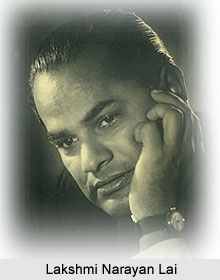 Lakshmi Narayan Lai was a popular Hindi dramatist, teacher and also theatre worker. He was born in Jalalpur, Faizabad district, in the Indian state of Uttar Pradesh, in the year 1927. He was deeply rooted in the villages of India, the common people`s way of life, and the Indian tradition. Simultaneously with mythological or historical background, his literature used contemporary surroundings as well. Experimentation with symbols and imagery, and depiction of human relations, especially complex, free, and multidimensional man-woman relationships, made his plays meaningful in modern Hindi theatre.
Lakshmi Narayan Lai was a popular Hindi dramatist, teacher and also theatre worker. He was born in Jalalpur, Faizabad district, in the Indian state of Uttar Pradesh, in the year 1927. He was deeply rooted in the villages of India, the common people`s way of life, and the Indian tradition. Simultaneously with mythological or historical background, his literature used contemporary surroundings as well. Experimentation with symbols and imagery, and depiction of human relations, especially complex, free, and multidimensional man-woman relationships, made his plays meaningful in modern Hindi theatre.
Life in Theatre for Lakshmi Narayan Lai
He wrote thirty-five full-length and over forty one-act scripts. The important longer works include Andha kuan i.e. "Blind Well" in 1956, Madacactus i.e. "Female Cactus" in 1959, Raktakamal or "Blood-red Lotus" in 1962, Darpan in 1964. Some others can be mentioned as Suryamukh i.e. "Sunflower" in 1968, Mr Abhimanyu in 1971, Curfew in 1971, Abdulla diwana i.e. "Insane Abdulla" in 1973, Vyaktigat i.e. "Personal" in 1974, Yakshaprashna i.e. `Yaksha`s Questions` in 1976, and Ram ki ladai i.e. "Ram`s Battle" in 1979. Most were staged soon after publication while some were staged before that. Mada cactus, Darpan, Curfew, Abdulla diwana, and Vyaktigat became very popular and many renowned directors produced one or more of these plays. Because of its experimental structure and portrayal of sexuality with a modern sensibility, Mada cactus proved a turning point in the new Hindi theatre movement.
Four collections of Lai`s one-act drama are available. The names are as follows Taj Mahal ke ansu i.e. "Tears of the Taj Mahal" in 1956, Natak bahurangi i.e. "Multi-coloured Drama" in 1960, Natak bahurupi i.e. `Multi-formed Drama` in 1964, and Mere shreshtha ekanki i.e. `My Best One-acts` in 1972. Amateur groups and students regularly perform them. Lai was himself directly connected to production, as a practicing theatre activist with his groups. Those were Natya Kendra in Allahabad since 1958 and Samvad in New Delhi. His contribution as a critic was equally important. Rangmanch aur natak ki bhumika i.e. "Role of the Stage and Drama", Parsi Hindi rangmanch i.e. "The Parsi Hindi Stage", Adhunik Hindi natak aur rangmanch i.e. "Modern Hindi Drama and Stage", and Rangmanch dekhna aur janna i.e. "To See and Know the Stage" are valuable books. These books deal with theatre, Indian tradition, and Hindi playwriting in detail. His combination of traditional and modern outlook enabled him to evaluate Hindi theatre in a balanced and realistic way.
Lakshmi Narayan Lai died in 1987.




